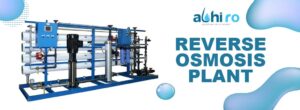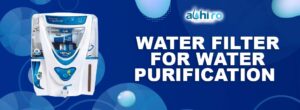
Have you ever wanted to ensure you’re drinking and cooking with clean water, free of unwanted contaminants? An undersink water filter can give you the peace of mind that comes with knowing your family is enjoying chemical-free, high-quality water.
An undersink water filter is a popular and convenient way to improve the taste and safety of drinking water. It is a specially designed filtration system that can be installed directly underneath your kitchen sink. Undersink filters are able to remove pollutants from your water supply, such as dirt, sediment, chlorine, and heavy metals like lead.
Fortunately, this guide will provide you with all the information of undersink water filter and what is necessary to help you choose the right one. It includes an overview of different types of filters, as well as a discussion on how to select the best model for maximum effectiveness.
What Is Undersink Water Filter? How Does It Work?
A undersink water filter is a device used to purify water by removing impurities and contaminants like chlorine, lead, sediment, chemicals, bacteria, and cysts. The system consists of an activated carbon filter or reverse osmosis membrane that mechanically removes particles from the water as it passes through.
In addition to reducing unpleasant tastes and odors, they provide safe drinking water by reducing health-related contaminants found in tap water. Installing an undersink filter helps reduce expenses associated with purchasing bottled water while providing clean and filtered drinking water for your home or office.
And How Does It Work? An undersink filter works by filtering out harmful contaminants as the water passes through its filtration system. The filter typically consists of a sediment pre-filter and an activated carbon filter. The sediment pre-filter reduces the amount of silt, dirt and other particulates found in tap water, while the carbon filter removes additional contaminants like chlorine, lead, and chemicals.
Depending on the type of filtration system used, undersink filters may also incorporate reverse osmosis membranes to help remove even more harmful substances from the water. Once filtered through these systems, the pure water passes safely into your drinking container or sink for you to enjoy.
Why Do We Need An Undersink Water filter?
A good quality undersink water filter is an essential part of a healthy lifestyle. It helps to purify and improve the taste, smell, and clarity of your drinking water by removing chlorine, lead, heavy metals, and other contaminants from it. By using an undersink water filter you can drastically reduce your exposure to these harmful chemicals which can be detrimental to our health.
Undersink water filters also help to conserve resources by reducing reliance on bottled water as they provide clean filtered water directly from the tap. They are great for anyone who wants a convenient way to access clean drinking water without investing in expensive filtration systems or bottles of purified water.
Furthermore, with its superior performance over standard faucet-mounted filters, undersink water filters can provide a higher level of filtration than otherwise possible.
Abhiro – Best Undersink Water Filter
Abhiro Water Purifier is the perfect choice when it comes to getting pure, clean drinking water. Abhiro’s state-of-the-art technology ensures that your water is free of contaminants and bacteria, making sure you have safe and healthy drinking water for yourself and your family. The undersink filters are easy to install and maintain, and their slim design makes them the perfect addition to any kitchen.
With top-notch performance and features like carbon block filtration, ultrafiltration membrane filtering, reverse osmosis filtration, ultraviolet disinfection, sediment pre-filters, and post-filter cartridges, you can be sure you’re getting the best quality water possible. Abhiro is your go-to source for safe, pure drinking water. With an Abhiro undersink water filter, you can depend on clean, healthy drinking water every time. Make the switch today and experience the difference!
Abhiro Water Purifier is committed to providing the finest quality of service when it comes to water purification. Our team of experts is available 24/7 to answer any questions you may have about our products, give advice on installation, provide after-sales support and more. Along with their unparalleled customer service, Abhiro also provides premium warranty services to guarantee satisfaction from our products.
How Does It Cost To Install An Undersink Water Filter?
An undersink water filter can be a great solution for providing clean and safe drinking water in your home. The cost of an undersink water filter varies depending on the type and brand you use, as well as any additional parts or accessories that may be needed to install it. Generally speaking, the cost of installing an undersink water filter system ranges from 10k – 15k ruppes, plus installation fees if necessary.
Some factors to consider when choosing an undersink water filter are its purification capabilities, design options (e.g., countertop vs wall-mounted), size (e.g., 5-stage vs single stage) and warranty period offered. Depending on these factors, the price will vary significantly. Additionally, some types of filter require additional items such as replacement filters, which can add to the cost.
When considering an undersink water filter, it’s important to do your research and ensure that you are investing in a system that meets all of your needs. The quality and price will vary depending on what type of filter you choose, so it is worth shopping around for an option that fits both your budget and requirements.
In the long run, installing a high-quality undersink water filter may be more cost effective since it could last many years with proper maintenance. All in all, the cost to have an undersink water filter installed depends on the type, size and brand you select. Make sure to do your research before making any decisions to ensure that you get the best possible value for your money.
Types of Undersink Water Filters
There are several types of undersink water filters available on the market, including:
1) Carbon Block Filters
Carbon block filters are one of the most popular types of undersink water filters. They use activated carbon to remove impurities from the water, including chlorine, lead, and other chemicals. Carbon block filters are effective at removing impurities and improving the taste and odor of drinking water.
2) Reverse Osmosis Filters
Reverse osmosis filters are another popular type of undersink water filter. They work by forcing water through a semi-permeable membrane, which removes impurities and contaminants. Reverse osmosis filters are highly effective at removing impurities, but they can be more expensive and take up more space compared to other types of filters.
3) Multi-stage Filters
Multi-stage filters are designed to remove a variety of impurities and contaminants from the water, including heavy metals, chlorine, and other chemicals. Multi-stage filters typically use a combination of carbon and reverse osmosis to provide effective filtration.
Advantages Of Undersink Water Filters
Undersink water filters offer a variety of benefits, including:
Improved Taste and Odor of Drinking Water
One of the main advantages of undersink water filters is that they can greatly improve the taste and odor of drinking water. Water filters remove impurities and contaminants that can affect the taste and odor of water, such as chlorine, heavy metals, and other chemicals.
Cost-effective
Undersink water filters are cost-effective compared to other filtration systems such as reverse osmosis. They are also more cost-effective than buying bottled water, which can be expensive and bad for the environment.
Space-saving
Undersink water filters are compact and take up very little space, making them ideal for smaller homes and apartments. They are also easy to install, making them a convenient solution for people who don’t have a lot of space for a large filtration system.
Easy Maintenance
Undersink water filters are easy to maintain, and their filters can be easily replaced when they need to be. This makes them an ideal solution for people who want to ensure they have clean drinking water without having to worry about complicated maintenance procedures.
Disadvantages Of Undersink Water Filter:
Installation Costs – Undersink filters require professional installation, which can be costly depending on the type of filter you purchase and the complexity of your plumbing system.
Limited Capacity – Most undersink filters have limited capacities, so they will need to be changed more frequently than some countertop or pitcher models. This can be a hassle if you’re not used to changing filters regularly.
Maintenance – Undersink water filters require regular cleaning and filter changes which can be quite time-consuming and expensive if done incorrectly. Make sure you know how to properly maintain your filter before installing it.
Undersink water filters offer many advantages over traditional filtration systems, but there are also some disadvantages that should be considered when making your decision. It is important to weigh the pros and cons according to your needs in order to get the best product for your home. With proper installation and maintenance, an undersink filter can provide clean, healthy drinking water for years to come.
Conclusion
Investing in a good undersink water filter is the best way to ensure that you have access to clean, healthy drinking water at all times. Research different types of filters and look for one that fits both your budget and requirements.
Abhiro is a great choice if you are looking for reliable quality at an affordable price. Shop around and make sure to read reviews before investing in a system so you know exactly what you’re getting into.
We hope that you understand what an undersink water filter does and how it works, you can make sure that you find one that meets your needs and provides clean drinking water for your family. Armed with this knowledge, you should now be ready to find the perfect undersink water filter for your home. Thanks for reading.
Also Read:



